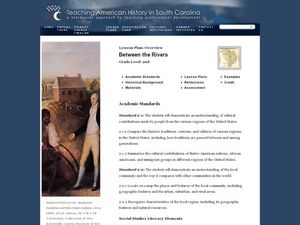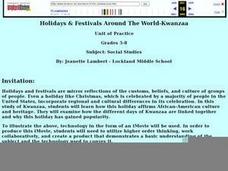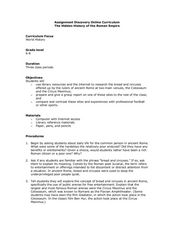Curated OER
A Trip Back in Time
Second graders, through the following 10 lessons, develop an understanding of what life was like in Ancient Greece.
Curated OER
Centennial: Have I Got a Story for You
Students identify the clues that folklore provides about Utah's past, and create a piece of folklore for a place or event in or near their community.
National First Ladies' Library
Executive Order 9066: Japanese-American Internment
Students analyze conditions under which sections of United States Constitution are superceded, research history of Native Americans, African Americans, and Japanese Americans, and debate policy of reparations for various minority groups...
Curated OER
The Atomic Bomb: Hiroshima and Nagasaki
In this atomic bomb worksheet, learners read facts about the atomic bomb and the effects of the bomb in the cities Hiroshima and Nagasaki. Students complete 3 activities using the text.
Curated OER
The Role of African Slaves on South Carolina Rice Plantations
Fourth graders investigate the role of African American slaves in rice plantations. In this slave life instructional activity, 4th graders discuss the products produced in the 13 colonies. Students discuss the importance of rice to South...
Curated OER
The Enemy that Never Was
Students write speeches explaining why Japanese Canadians were not a threat to Canada during World War 2. In this Japanese Canadians lesson plan, students learn about racism, and how the Japanese were targeted but not a threat during the...
Curated OER
Ancient Mediterranean Trade Fair
Sixth graders begin the lesson by discussing how artifacts are located. In groups, they define the terms supply, demand, resources and trade and discuss how the United States is affected by International trade. They use this...
Curated OER
Issues in Public Education During the Kentucky Civil Rights Era
Students conduct oral history interviews and research historical and contemporary media articles about multiculturalism and diversity.
Curated OER
"An Eye For An Eye, A Tooth For A Tooth"
Sixth graders debate their reactions to two different historical documents about managing a society. In this U.S. history lesson, 6th graders read two articles on codes and laws from different time periods and debate their...
Curated OER
Between the Rivers
Second graders compare and contrast historical American cultures. In this American history lesson, 2nd graders participate in reading, writing, oral, and hands on activities. Students discuss the similarities and differences...
Curated OER
Wartime and the Bill of Rights: The Korematsu Case
Students examine the balance between civil liberties and protection. In this national security lesson, students explore the Korematsu case which references the Japanese internment camps of World War II. Students draw comparisons between...
Curated OER
Morse Code, Telegraph, and West Virginia
Young scholars prepare for a visit to the West Virginia State Museum. In this West Virginia history lesson, students research the Morse Code and telegraph. Young scholars create their own Morse Code and discuss communication history...
Curated OER
Winston Churchill
In this World War II activity, students read a 3-paragraph selection about Winston Churchill and then respond to 5 short answer questions based on the selection.
Curated OER
Holidays & Festivals Around The World-Kwanzaa
Students use technology to conduct research. They use technology to convey principles and information. They demonstrate proficiency in the use of computer based technology.
Curated OER
The Founding of Los Angeles, California
Seventh graders examine the social and cultural impact of settler groups in California and the origins of the founding of Los Angeles, California. They read and discuss an informational handout, and discuss what it is and was like to...
Curated OER
The Hidden History of the Roman Empire
Learners compare entertainment in ancient Rome to entertainment today. For this ancient Rome lesson, students research the details regarding the entertainment that occurred in the Colosseum and the Circus Maximus in Rome. Learners...
Curated OER
1848-1914: Can You Name that Age?-
In this European history worksheet, students read a 2-page selection about the Industrial Revolution, and then respond to 6 short answer questions about the information presented.
Curated OER
The Oblate Sisters of Providence and Early African American Education in Baltimore
Eighth graders examine the educational system for free African-Americans in Baltimore in the early 19th century. For this American History lesson, 8th graders read a handout and answer focus questions. Students analyze...
Curated OER
Revolt in Boston
Eleventh graders study the American Revolution. In this American History lesson plan, 11th graders analyze primary sources. Students participate in a simulation on taxes.
Curated OER
Living on a Cotton Farm: Mexican Americans Life In Texas
Seventh graders are introduced to the processes of cotton farming in the early 20th century. In groups, they examine the role of Mexican Americans on the farms and the impact of a boom and bust economy on cotton. They identify the...
Curated OER
Views of 9/11
Fifth graders examine through research ways people around the world viewed events of September 11, 2001, analyze how United States foreign policies have caused conflict with other regions and countries, research and read first person...
Curated OER
Zimbabwe
Students explore the hardships being faced by the people in Zimbabwe. In this World History lesson plan, students research the challenges of Zimbabwe, such as hunger, poverty, low life expectancy and political controversy. ...
Curated OER
Simulating a Middle East Peace Summit
Tenth graders explore the issues in the Middle East. In this World History lesson plan, 10th graders research the problems between Palestine and Israel. Students write a speech on their point of view of the peace process.
Curated OER
Empire State-Building
Students explore how empires around the globe have impacted the world in which they have existed. They analyze whether or not the United States is an imperialist nation and create their own empires based on their understanding of empires...























